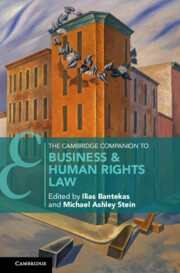Book contents
- The Cambridge Companion to Business & Human Rights Law
- Cambridge Companions to Law
- The Cambridge Companion to Business & Human Rights Law
- Copyright page
- Contents
- Figures and Tables
- Contributors
- Preface
- Cases
- Abbreviations
- 1 Business and Human Rights
- 2 Reconciling International Human Rights with International Trade
- 3 Neoliberalism, State-Capitalism and European Ordo-Liberalism
- 4 Corporate Governance and Corporate Social Responsibility
- 5 The Role of Business in International Development and the Attainment of the Sustainable Development Goals
- 6 The Business Case for Human Rights
- 7 The UN Guiding Principles on Business and Human Rights and Its Predecessors
- 8 The Regulatory Framework of Multinational Enterprises
- 9 The UN Global Compact and the OECD Guidelines for Multinational Enterprises and Their Enforcement Mechanisms
- 10 Taxation and Business
- 11 Corporate Accountability for the Natural Environment and Climate Change
- 12 Corporate Accountability for Corruption and the Business Case for Transparency
- 13 Disability, Business and Human Rights
- 14 Gender, Business and Human Rights
- 15 The Business Sector and the Rights to Work and Just and Favourable Conditions of Work
- 16 Responsible Lending
- 17 Business and Human Rights Approaches to Intellectual Property
- 18 The Role of Human Rights in Investment Law and Arbitration
- 19 The Use of International Arbitration Tribunals for Business and Human Rights Disputes
- 20 Innovative Contractual Remedies with Indigenous Peoples
- 21 The Role of Ethics in Corporate Human Rights Impact Assessments
- 22 Addressing Human Rights Impacts in Sustainability Reporting
- 23 Leveraging the Consumer-Led Movement to Strengthen Sustainable Business
- 24 The Structural Complexity of Multinational Corporations and the Effect on Managing Human Rights Risks in the Supply Chain
- 25 Towards a UN Business and Human Rights Treaty
- Index
19 - The Use of International Arbitration Tribunals for Business and Human Rights Disputes
Published online by Cambridge University Press: 10 September 2021
- The Cambridge Companion to Business & Human Rights Law
- Cambridge Companions to Law
- The Cambridge Companion to Business & Human Rights Law
- Copyright page
- Contents
- Figures and Tables
- Contributors
- Preface
- Cases
- Abbreviations
- 1 Business and Human Rights
- 2 Reconciling International Human Rights with International Trade
- 3 Neoliberalism, State-Capitalism and European Ordo-Liberalism
- 4 Corporate Governance and Corporate Social Responsibility
- 5 The Role of Business in International Development and the Attainment of the Sustainable Development Goals
- 6 The Business Case for Human Rights
- 7 The UN Guiding Principles on Business and Human Rights and Its Predecessors
- 8 The Regulatory Framework of Multinational Enterprises
- 9 The UN Global Compact and the OECD Guidelines for Multinational Enterprises and Their Enforcement Mechanisms
- 10 Taxation and Business
- 11 Corporate Accountability for the Natural Environment and Climate Change
- 12 Corporate Accountability for Corruption and the Business Case for Transparency
- 13 Disability, Business and Human Rights
- 14 Gender, Business and Human Rights
- 15 The Business Sector and the Rights to Work and Just and Favourable Conditions of Work
- 16 Responsible Lending
- 17 Business and Human Rights Approaches to Intellectual Property
- 18 The Role of Human Rights in Investment Law and Arbitration
- 19 The Use of International Arbitration Tribunals for Business and Human Rights Disputes
- 20 Innovative Contractual Remedies with Indigenous Peoples
- 21 The Role of Ethics in Corporate Human Rights Impact Assessments
- 22 Addressing Human Rights Impacts in Sustainability Reporting
- 23 Leveraging the Consumer-Led Movement to Strengthen Sustainable Business
- 24 The Structural Complexity of Multinational Corporations and the Effect on Managing Human Rights Risks in the Supply Chain
- 25 Towards a UN Business and Human Rights Treaty
- Index
Summary
The focus of this chapter is the use of international arbitration for BHR disputes. The first part sets out the theoretical framework. It places arbitration within the context of the UN Guiding Principles on Business and Human Rights (“UNGPs”) and the barriers to individuals securing remedies. The merits and limitations of arbitration as an existing mechanism for resolving BHR disputes are discussed. The authors also consider how international arbitration, with appropriate modifications, may be complementary to, and operate in parallel with, both existing state-based judicial mechanisms as well as possible multilateral institutions for resolution of BHR disputes in the future. The second part of the chapter considers the pragmatic angle of arbitration of BHR disputes through: (i) the prism of the experience of the Bangladesh Accord Arbitrations; (ii) the formulation of BHR-specific arbitral procedures in the form of the Hague Rules; and (iii) the potential embrace of BHR arbitration in a range of specific industries, namely fast fashion, mega-sporting events, and commerce at sea.
- Type
- Chapter
- Information
- The Cambridge Companion to Business and Human Rights Law , pp. 428 - 454Publisher: Cambridge University PressPrint publication year: 2021

